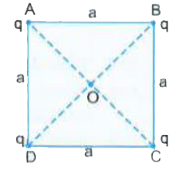If electric potential is zero, the →E are:
zero
not zero
insufficient formation
∞
The correct Answer is:B
To solve the question "If electric potential is zero, what can we say about the electric field →E?", we can follow these steps:
1. Understanding Electric Potential and Electric Field:
- Electric potential (V) at a point in space is a measure of the potential energy per unit charge at that point.
- Electric field (→E) is related to electric potential by the equation:
→E=−∇V
- This means that the electric field is the negative gradient of the electric potential.
2. Analyzing the Condition of Zero Electric Potential:
- If the electric potential V is zero at a point, it doesn't necessarily mean that the electric field →E is also zero.
- The electric field can be present even when the potential is zero, as the electric field is dependent on how the potential changes in space.
3. Understanding the Implications:
- If V=0 at a specific point, it indicates that the potential energy per unit charge is zero at that location.
- However, if there are other points in the vicinity where the potential is not zero, there can still be a non-zero electric field pointing towards or away from the region of higher potential.
4. Conclusion:
- Therefore, we can conclude that if the electric potential is zero at a point, the electric field →E at that point can be either zero or non-zero depending on the surrounding electric potential configuration.
Final Answer:
If electric potential is zero, the electric field →E can be either zero or non-zero.
---
- Electric potential (V) at a point in space is a measure of the potential energy per unit charge at that point.
- Electric field (→E) is related to electric potential by the equation:
→E=−∇V
- This means that the electric field is the negative gradient of the electric potential.
- If the electric potential V is zero at a point, it doesn't necessarily mean that the electric field →E is also zero.
- The electric field can be present even when the potential is zero, as the electric field is dependent on how the potential changes in space.
- If V=0 at a specific point, it indicates that the potential energy per unit charge is zero at that location.
- However, if there are other points in the vicinity where the potential is not zero, there can still be a non-zero electric field pointing towards or away from the region of higher potential.
- Therefore, we can conclude that if the electric potential is zero at a point, the electric field →E at that point can be either zero or non-zero depending on the surrounding electric potential configuration.
If electric potential is zero, the electric field →E can be either zero or non-zero.
Topper's Solved these Questions
- SAMPLE PAPER 5BOOK - EDUCART PUBLICATIONCHAPTER - SAMPLE PAPER 5EXERCISE - SECTION - B
24 Videos
- SAMPLE PAPER 5BOOK - EDUCART PUBLICATIONCHAPTER - SAMPLE PAPER 5EXERCISE - SECTION - C
6 Videos
- SAMPLE PAPER 3BOOK - EDUCART PUBLICATIONCHAPTER - SAMPLE PAPER 3EXERCISE - SECNTION -C
6 Videos
- SAMPLE PAPER 6BOOK - EDUCART PUBLICATIONCHAPTER - SAMPLE PAPER 6EXERCISE - Section-C
6 Videos
Similar Questions
Let there be a uniform electric field "E" existing along the positive X-direction.Assume electric potential to be zero at the origin.Potential at the point x=x0 is
View SolutionIs electrostatic potential necessarily zero at a point where electric field is zero ? Illustrate your answer.
View Solution
Knowledge Check
If uniform electric field →E=E0ˆi+2E0ˆj, where E0 is a constant exists in a region of space and at (0,0) the electric potential V is zero, then the potential at (x0,2x0) will be -
AzeroB−5E0x0C−3E0x0D−√5E0x0If unifrom electric filed →E=E0ˆi+2E0ˆj, where E0 is a constant, exists in a region of space and at (0,0) the electric potential V is zero, then the potential at (x0,0) will be.
AzeroB−E0x0C−2E0x0D−√5E0x0Statement :-A:-Electrical potential may exist at a point where the electrical potential field is zero.
Statement B:- Electrical field may exist at a point where the electircal potential is zero.
Statement C:- The electric potential inside a charge conducting sphere is constant .AA,B are trueBB,C are trueCA,C are trueDA,B,C are true.
There is a uniformly charged non conducting solid sphere made of material of dielectric constant one. If electric potential at infinity be zero. Then the potential at its surface is V. if we take electric potential at its surface to be zero. Then the potential at the centre will be
View SolutionAssertion (A): For identical charges of magnitude g each are placed at the vertices of a square of side'a'. The electric field at the centre point O is zero but electric potential is non-zero and finite. Reason
(R) : Electric field is a vector quantity but electric potential is a D scalar.

View SolutionThe electric potential of earth is taken to be zero because earth is a good
View SolutionThe electric potential of earth is taken to be zero because earth is a good
View SolutionThe electric field and the electric potential at a point are E and V respectively.
View Solution
